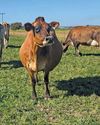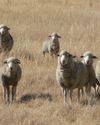Versuchen GOLD - Frei
Diversifying with a new variety pays off for pumpkin producer
Farmer's Weekly
|December 18, 2020
The demand for convenient meals and easy-to-prepare vegetables is opening up marketing opportunities for the Hokkaido pumpkin, a newcomer to South Africa. Small, and with an edible peel, the variety holds much promise for expanding cucurbit cultivation. Lindi Botha spoke to Francois Steyn about farming the Hokkaido.

FAST FACTS
- The Hokkaido, a pumpkin variety newly introduced to South Africa, is finding a ready market as it is easy to prepare.
-
Cultivation practices are similar to those of butternuts.
-
Planting butternuts and Hokkaido allows a farmer to offer two vegetable types without complicating production practices.
Having a diverse basket of produce helps a vegetable farmer reduce production risk and cope with fluctuating market prices. The trick, though, is finding the right mix of vegetables to avoid over-complicating production.
Francois Steyn of JF Steyn Boerdery near Komatipoort, Mpumalanga, is always keen to try new varieties, provided there is a market. As part of this approach, he cultivates close relationships with buyers and third-party packhouses, putting him first in line to hear about new opportunities, and the trust flowing from this gives him greater confidence to try something new.
When he was approached to plant a pumpkin variety relatively unknown in South Africa, the Hokkaido (also called the red kuri squash), he took up the challenge, and has found that this addition to his crop mix fits in well with his production cycles and has a good, albeit small, market.
The Hokkaido is a variety of the Cucurbita family, and belongs to the Hubbard squash group.
“Although it’s an entirely different vegetable, the production practices are very similar to those of butternuts, so it’s a good fit. It’s an easy-to-grow pumpkin with a yield of around 20t in 90 days. It’s also a high-yielding variety that produces uniformly sized fruit,” says Steyn.
Diese Geschichte stammt aus der December 18, 2020-Ausgabe von Farmer's Weekly.
Abonnieren Sie Magzter GOLD, um auf Tausende kuratierter Premium-Geschichten und über 9.000 Zeitschriften und Zeitungen zuzugreifen.
Sie sind bereits Abonnent? Anmelden
WEITERE GESCHICHTEN VON Farmer's Weekly
Farmer's Weekly
Farmers 'unilateral victims' of climate
Gyeongbuk Provincial Council member Choi Taerim has demanded immediate and substantial support for apple farmers in the South Korean province, urging immediate measures for apple farmers affected by heat damage be implemented, The Asia Business Daily recently reported.
1 min
November 21-28, 2025

Farmer's Weekly
Top agri workers celebrated in the Western Cape
Shannon Robertson, assistant livestock manager at Boschendal near Franschhoek, was crowned the overall winner of the 2025 Western Cape Prestige Agri Awards, held in Durbanville.
1 min
November 21-28, 2025

Farmer's Weekly
Smart dairying: running Jerseys on pasture
The dairy farming sector has seen innovation in milk parlour and cow comfort technology that have allowed farmers to not only yield higher volumes, but extend the productive lifespan of their cows. Albrecht de Jager told Henning Naudé about his approach to maintaining a pasture-raised Jersey herd while utilising precise data measuring technology to ensure quality milk output and optimal cow comfort.
6 mins
November 21-28, 2025

Farmer's Weekly
High-performance dairy farming in the Eastern Cape: the Rufus Dreyer approach
Dairy farming is often described as one of the most technically demanding and strategically complex branches of agriculture.
6 mins
November 21-28, 2025

Farmer's Weekly
Design your stables and camps to assist in AHS control
Keep horses away from areas where disease-carrying midges multiply, like natural pools, lakes, streams and dams, advises Dr Mac.
2 mins
November 21-28, 2025

Farmer's Weekly
The rolling chant that has echoed through SA over the past 30 years
Johan van der Nest is renowned in auction circles and was the first freelance stud-stock auctioneer to begin operating in South Africa.
10 mins
November 21-28, 2025

Farmer's Weekly
Flight from the Red Army
The fall of the Third Reich in 1945 was defined by the Red Army's brutal invasion of Germany. Mike Burgess tells how the Hoppe family trekked from Finowfurt near Berlin to Preetz in Schleswig-Holstein to escape the brutality.
6 mins
November 21-28, 2025

Farmer's Weekly
How to plan a pre-sale feeding programme
Proper feeding of animals before a sale can help producers catch the eye of buyers and increase profits, but it is important to choose the right ration.
8 mins
November 21-28, 2025

Farmer's Weekly
How women are transforming coffee production in Kenya
A group of Kenyan smallholder women farmers are transforming the country's high-value coffee sector by pooling their resources.
5 mins
November 21-28, 2025

Farmer's Weekly
Tough times ahead for SA's grain farmers
Grain farmers face a difficult year ahead with lower grain prices and high production costs
3 mins
November 21-28, 2025
Translate
Change font size
